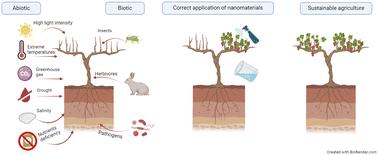当前位置:
X-MOL 学术
›
Environ. Sci.: Nano
›
论文详情
Our official English website, www.x-mol.net, welcomes your
feedback! (Note: you will need to create a separate account there.)
Nanomaterials for managing abiotic and biotic stress in the soil–plant system for sustainable agriculture
Environmental Science: Nano ( IF 5.8 ) Pub Date : 2024-11-27 , DOI: 10.1039/d4en00789a Loren Ochoa, Manoj Shrivastava, Sudhakar Srivastava, Keni Cota-Ruiz, Lijuan Zhao, Jason C. White, Jose Angel Hernandez-Viezcas, Jorge L. Gardea-Torresdey
Environmental Science: Nano ( IF 5.8 ) Pub Date : 2024-11-27 , DOI: 10.1039/d4en00789a Loren Ochoa, Manoj Shrivastava, Sudhakar Srivastava, Keni Cota-Ruiz, Lijuan Zhao, Jason C. White, Jose Angel Hernandez-Viezcas, Jorge L. Gardea-Torresdey

|
As the global population steadily increases, the need to increase agricultural productivity has become more pressing. It is estimated that agricultural production needs to double in less than 30 years to meet the projected food demand. However, crop species are being cultivated under a range of increasingly challenging environmental stressors, including the effects of climate change and factors. To address these issues, nanotechnology has emerged as an enabling strategy to bolster plant resistance to the adverse effects of stressors and improve their overall performance. In this review, we evaluate recent research in this field, examining the strategies by which nanomaterials (NMs) and nanoparticles (NPs) have been used to facilitate enhanced tolerance to pests, excessive salinity in soil, pathogenic fungi, and other stressors. The intent is to focus on the mechanisms by which plants cope with environmental stressors at the physiological and molecular levels. We also examine how plants interact with and acquire NMs, with a specific focus on the mechanisms behind their beneficial effects regarding stress response. Our review also evaluates key knowledge gaps and offers suggestions on how to address them. Additionally, we discuss the potential of NMs to enhance agricultural production systems and highlight essential considerations for mitigating crop stress and promoting sustainable agriculture at a global scale. While the use of nanotechnology in the agricultural sector is growing and shows tremendous promise, more mechanistic studies and field-scale demonstrations are needed to fully understand and optimize the use of nanomaterials on plants stress tolerance in a changing climate. In addition, few studies conducted life cycle field experiments to verify the effects of nano-agrichemicals on yield and nutritional quality, and importantly, there is a lack of multiple-year and multiple-location experiments. Only by doing this can the technology-readiness-level of nano-enabled agro-technologies be improved and forwarded to commercial application.
中文翻译:

用于管理土壤-植物系统中非生物和生物胁迫的纳米材料,实现可持续农业
随着全球人口的稳步增长,提高农业生产力的需求变得更加紧迫。据估计,农业产量需要在不到 30 年的时间内翻一番,才能满足预计的粮食需求。然而,作物物种的种植受到一系列越来越具有挑战性的环境压力,包括气候变化和因素的影响。为了解决这些问题,纳米技术已成为一种有利策略,可以增强植物对压力源不利影响的抵抗力并提高其整体性能。在这篇综述中,我们评估了该领域的最新研究,研究了纳米材料 (NMs) 和纳米颗粒 (NPs) 被用于促进增强对害虫、土壤中过度盐分、病原真菌和其他压力源的耐受性的策略。其目的是关注植物在生理和分子水平上应对环境压力的机制。我们还研究了植物如何与 NM 相互作用并获得 NMs,特别关注它们对压力反应的有益影响背后的机制。我们的综述还评估了关键知识差距,并就如何解决这些差距提供了建议。此外,我们还讨论了 NM 在增强农业生产系统方面的潜力,并强调了在全球范围内缓解作物压力和促进可持续农业的基本考虑因素。虽然纳米技术在农业领域的使用正在增长并显示出巨大的前景,但需要更多的机械研究和田间规模的演示,以充分了解和优化纳米材料在不断变化的气候中对植物的抗逆性使用。 此外,很少有研究进行生命周期田间实验来验证纳米农用化学品对产量和营养质量的影响,重要的是,缺乏多年和多地点的实验。只有这样做,纳米农业技术的技术就绪水平才能得到改善并向前推进商业应用。
更新日期:2024-11-27
中文翻译:

用于管理土壤-植物系统中非生物和生物胁迫的纳米材料,实现可持续农业
随着全球人口的稳步增长,提高农业生产力的需求变得更加紧迫。据估计,农业产量需要在不到 30 年的时间内翻一番,才能满足预计的粮食需求。然而,作物物种的种植受到一系列越来越具有挑战性的环境压力,包括气候变化和因素的影响。为了解决这些问题,纳米技术已成为一种有利策略,可以增强植物对压力源不利影响的抵抗力并提高其整体性能。在这篇综述中,我们评估了该领域的最新研究,研究了纳米材料 (NMs) 和纳米颗粒 (NPs) 被用于促进增强对害虫、土壤中过度盐分、病原真菌和其他压力源的耐受性的策略。其目的是关注植物在生理和分子水平上应对环境压力的机制。我们还研究了植物如何与 NM 相互作用并获得 NMs,特别关注它们对压力反应的有益影响背后的机制。我们的综述还评估了关键知识差距,并就如何解决这些差距提供了建议。此外,我们还讨论了 NM 在增强农业生产系统方面的潜力,并强调了在全球范围内缓解作物压力和促进可持续农业的基本考虑因素。虽然纳米技术在农业领域的使用正在增长并显示出巨大的前景,但需要更多的机械研究和田间规模的演示,以充分了解和优化纳米材料在不断变化的气候中对植物的抗逆性使用。 此外,很少有研究进行生命周期田间实验来验证纳米农用化学品对产量和营养质量的影响,重要的是,缺乏多年和多地点的实验。只有这样做,纳米农业技术的技术就绪水平才能得到改善并向前推进商业应用。






























 京公网安备 11010802027423号
京公网安备 11010802027423号